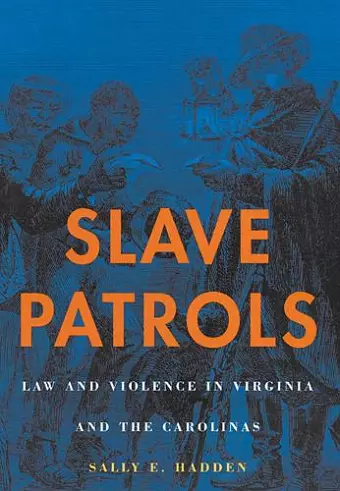Slave Patrols
Law and Violence in Virginia and the Carolinas
Format:Paperback
Publisher:Harvard University Press
Published:29th Nov '03
Currently unavailable, our supplier has not provided us a restock date

No one has examined slave patrols in such detail, unearthed the whole world of racial control they represented, and linked them to post-Civil War vigilantes and the KKK. The details on the recruitment of the patrols, their procedures and effect, and their shifting roles in different circumstances of public safety and disturbance are very well done. This is a real contribution to the history of race relations in the United States, and helps explain developments long after the patrols had died out. -- Bernard Bailyn, author of Ideological Origins of the American Revolution, Enlarged Edition (Harvard) The book is impressively researched and carefully written. Slave patrols did in fact constitute an important aspect of the history of slavery in the United States, but this is the first time that slave patrols have received undivided attention as to their origins and actual implementation. -- Winthrop D. Jordan, University of Mississippi
This book completes the grim picture of slavery by showing us the origins, nature, and extent of slave patrols in Virginia and the Carolinas from the late 17th century through the end of the Civil War. Here we see how the patrols, formed by county courts and state militias, were the closest enforcers of codes governing slaves throughout the South.
Obscured from our view of slaves and masters in America is a critical third party: the state, with its coercive power. This book completes the grim picture of slavery by showing us the origins, the nature, and the extent of slave patrols in Virginia and the Carolinas from the late seventeenth century through the end of the Civil War. Here we see how the patrols, formed by county courts and state militias, were the closest enforcers of codes governing slaves throughout the South.
Mining a variety of sources, Sally Hadden presents the views of both patrollers and slaves as she depicts the patrols, composed of "respectable" members of society as well as poor whites, often mounted and armed with whips and guns, exerting a brutal and archaic brand of racial control inextricably linked to post-Civil War vigilantism and the Ku Klux Klan. City councils also used patrollers before the war, and police forces afterward, to impose their version of race relations across the South, making the entire region, not just plantations, an armed camp where slave workers were controlled through terror and brutality.
Sally Hadden…has written the first definitive book on slave patrols… The book studies the roots, rules, procedures, progress, disintegration and legacy of Southern slave patrols during the 18th and 19th centuries. It is the most all-encompassing view of a long overlooked chapter of Southern history. * New York Voice *
Slave Patrols studies the roots, rules, procedures, progress, disintegration and legacy of Southern slave patrols in Virginia and the Carolinas in the 18th and 19th centuries. It is perhaps the most all-encompassing view yet of a long overlooked chapter of Southern history. The paucity of research done on slave patrols is seemingly out of proportion to the large role they played in the perpetuation of the slavery system in the South. * Research in Review *
Hadden offers insights into a part of U.S. history that has been little studied, despite the fact that it is an integral fact of that history… [Slave] patrols became part of the violent force used to react to slave revolts, the threat of such revolts, and runaways. Despite the bravado attached to their image, slave patrols were ‘an unequivocal manifestation of white fear.’ -- Vanessa Bush * Booklist *
Using a variety of sources [and] adding new details, [Hadden’s] in-depth analysis provides an understanding of the daily enforcement of slave laws and an awareness of how Southern police forces were influenced by slavery and white dominance… This is essential reading, with much to offer all scholars interested in American history, slavery, and race relations. -- Edward G. McCormack * Library Journal *
In a study that explores the roots of what we know today as racial profiling, [Hadden] focuses on the law-enforcement bands that existed from about 1700 to 1865 and were charged with ensuring that slaves did not escape their masters’ plantations… An incisive, scholarly study. * Publishers Weekly *
No one has examined slave patrols in such detail, unearthed the whole world of racial control they represented, and linked them to post–Civil War vigilantes and the KKK. The details on the recruitment of the patrols, their procedures and effect, and their shifting roles in different circumstances of public safety and disturbance are very well done. This is a real contribution to the history of race relations in the United States, and helps explain developments long after the patrols had died out. -- Bernard Bailyn, author of The Ideological Origins of the American Revolution: Enlarged Edition
The book is impressively researched and carefully written. Slave patrols did in fact constitute an important aspect of the history of slavery in the United States, but this is the first time that slave patrols have received undivided attention as to their origins and actual implementation. -- Winthrop D. Jordan, University of Mississippi
- Nominated for Albert J. Beveridge Award 2001
- Nominated for John H. Dunning Prize 2001
- Nominated for Littleton-Griswold Prize 2001
- Nominated for Willie Lee Rose Prize 2002
- Nominated for Julia Cherry Spruill Prize 2002
ISBN: 9780674012349
Dimensions: unknown
Weight: 503g
360 pages